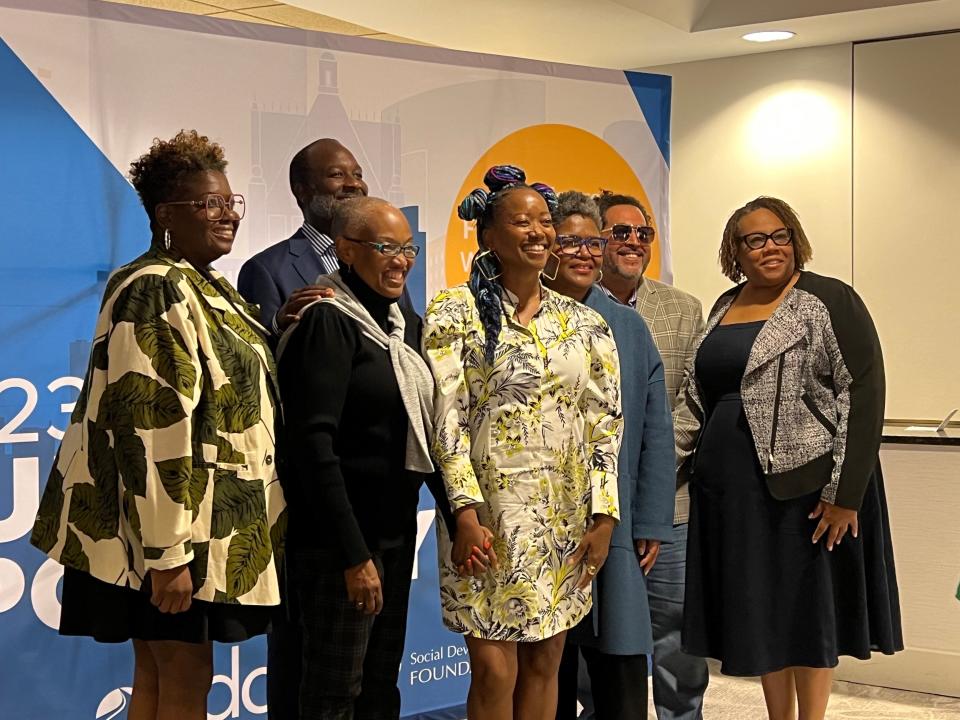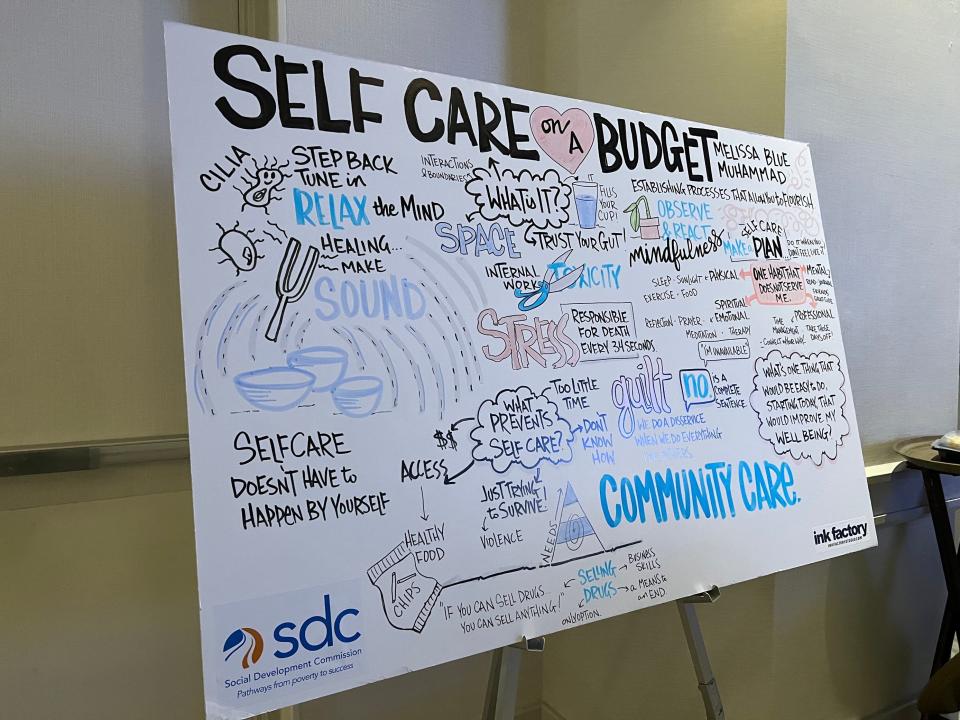'Living Single' star Erika Alexander speaks on Black storytelling, and other highlights from Milwaukee's Summit on Poverty

- Oops!Something went wrong.Please try again later.
Hundreds gathered in downtown Milwaukee for the Social Development Commission's Summit on Poverty on Thursday and Friday. The two-day annual conference brought together community advocates, state agencies and local leaders for conversations about eradicating poverty in the greater Milwaukee area.
Over 800 people registered for the event and participated in sessions on subjects such as the role of higher education in combating poverty, housing discrimination, homelessness and food justice.
Here's four highlights from the conference:
Speakers highlight importance of storytelling
The first day included a conversation with actress Erika Alexander, star of '90s hit TV series "Living Single." In a sit-down interview with SDC government affairs & executive support manager Abra Fortson, Alexander offered insight into her decades-long career as an activist, entrepreneur and director. Alexander has produced award-winning projects like "Good Trouble," a 2020 film that chronicled the life of late Congressman John Lewis, and "Finding Tamika," a podcast about the prevalence of Black women and girls going missing in the United States.
Alexander guided attendees through her creative process for narrative storytelling, with a focus on Black people and other marginalized groups. Referencing Florida Gov. Ron DeSantis' push for book bans in libraries across the state, she said that Black people must reclaim ownership over their stories and not allow their history or future to be written without their perspective.

In 2014, Alexander co-wrote the graphic novel "Concrete Park" with her then-husband Tony Puryear. The comic is an Afrofuturist tale that explores the experiences of "Earth's outcasts" living on a distant desert planet. The outcasts are faced with the realities of succumbing to gang violence and polarization or coming together to create a unified new world.
"People said Black people don't like science fiction because they don't see themselves in the future," Alexander said. "We wanted to disrupt the conversation around race and poverty and class."
SDC spotlights housing accessibility programs
The Summit on Poverty included eight sessions focused on expanding housing resources for Milwaukee residents.
On Thursday, the Metropolitan Milwaukee Fair Housing Council shared a presentation explaining common discrimination experiences faced by Milwaukee residents and identified protected classes in federal and state civil rights law. The civil rights enforcement agency takes on cases of illegal housing discrimination.
During the COVID-19 pandemic, SDC's Milwaukee Emergency Rental Assistance program served as a resource for Milwaukee residents seeking aid to remain in their homes. The organization gave $90 million dollars to 10,000 households for rent and utilities while also funneling participants into affiliated programs for career development and education.
In 2023, the organization is shifting its focus to homeownership in alignment with Wisconsin Help for Homeowners Program, said LaSonda Buck, SDC's housing director. The goal is to minimize the fear and anxiety that often emerges before a person's first attempt at buying a home, through counseling and financial management training.
"Everybody doesn't have to have a perfect credit score to own house, and I think that's what people are afraid of," she said. "We know there are some barriers or struggles, but the goal is to clean that up, get rid of those credit cards and liabilities and teach them how to do that credit repair."
Expert discusses child discipline and trauma

The conference's second day included a keynote address by Stacey Patton, assistant professor at the Cathy Hughes School of Communications at Howard University. Patton spoke about common discipline practices in the Black community, including spanking children.
Patton's research explores the impact of physical punishment on children and its links to depression, abuse in romantic relationships and death. In her presentation, Patton referenced the New York Times bestselling novel "The Body Keeps the Score," which details how frequent abuse can lead to lifelong physical and mental trauma. Her research and community conversations seek to inform adults about the consequences children face when their lives are guided by "violent coercion."
Beating children, Patton said, is often used as a mechanism used to get them behave like responsible adults. However, her research explores the increased likelihood of family destabilization when young people are "taught to believe that violence is natural, normal and a successful means for getting information across."
"Childhood is about surviving adults," Patton said at the beginning and end of her presentation.
Participants share oral stories about food journeys

Bringing together student researchers from across the state of Wisconsin, the Summit on Poverty began each day with "Poster Sessions" and student presentations. During this time, students shared analysis and data on topics like discrimination, food security and drug and alcohol abuse.
In partnership with the University of Wisconsin-Milwaukee, the event also included a Story Cart booth. The initiative aims to create an archive of community history that can be used for public and educational use. In the booth, attendees recorded oral stories, drawings and videos.
The 2023 Story Cart theme is food and land justice and participants were encouraged to share their food journeys, detailing how they gather, prepare and consume food.
A collection of SDC's community partners — including the Wisconsin Housing and Economic Development Authority, Self Help Credit Union, TMG and Wellpoint Care Network — also gathered in front of the Executive Ballroom to share resources with conference attendees.
This article originally appeared on Milwaukee Journal Sentinel: Four highlights from Milwaukee's Summit on Poverty

